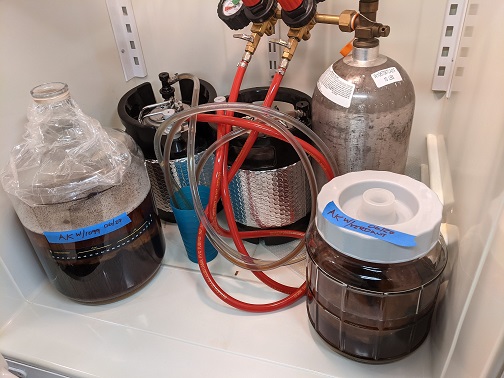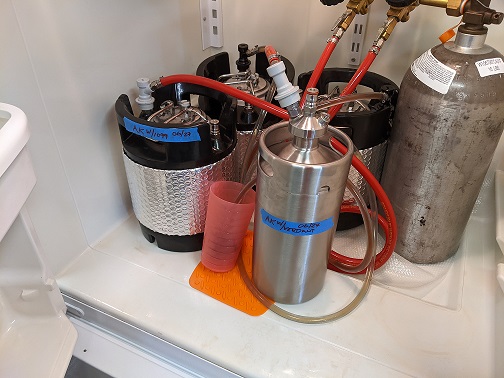schmurf
Well-Known Member
Many of the old Durden Park recipes calls for a maturation time for at least 3 months due to the heavy hopping rate, at least according to one of the authors.

I really wonder what the deal was with these 4-12 months ales. All my English ales are far beyond their peak after 4 months, except the barley wine. Do you know what might be the difference here between modern bitters and these keeping ales that moved their peak time to past 4 months?
Thanks mate, that is A LOT of hops. Neipa suddenly does not seem to be that new any more....They didn't have much in common with modern bitter - they were double the strength and way more hopped. As usual, you can get a good feel from Ron's recipes and snippets of history, but as an exterme, the 1851 William Younger XXS was 1.125 OG, 1.050 FG for 9.9% ABV (more once the Brett had got to it), with 27g/l (!!!) of hops added in the copper, which Ron translates as 137 IBU.
Who said Scottish beers weren't hoppy?
It is basically the fore runner to bitter, usually pale though.
Alrighty, then. Time for me to brew up an AK.
85% Fawcett Optic
5% Flaked Corn
10% DIY Invert
FWH EKG 3.5%AA 2-7/8oz (49IBU calc'd as 60m)
0m EKG 3.5%AA 1oz
Dry Hop EKG 3.5%AA 1/8oz (.25g/l)
Mash 60m @ 152°F
Boil 60m
OG 1.043
FG 1.012
Pub @ 68°F
BU:GU=1.13









![Craft A Brew - Safale S-04 Dry Yeast - Fermentis - English Ale Dry Yeast - For English and American Ales and Hard Apple Ciders - Ingredients for Home Brewing - Beer Making Supplies - [1 Pack]](https://m.media-amazon.com/images/I/41fVGNh6JfL._SL500_.jpg)

that sounds mighty tasty. Curious to see what you think of the C65 versus corn, and how balanced that may be. I did a side by side, and one with corn and one without (didn't substitute crystal). The one without was very unbalanced and harsh without the corn sweetness to mellow it out
question. As a US brewer just getting into brewing UK styles, AK seems very similar to British summer/golden recipes I’ve seen, but with the corn and sugar addition. Not sure if British summer ales are even a real thing, but would you say they are comparable at all? When I’ve had them, I always thought they tasted like a pale bitter

Curious to see what you think of the C65 versus corn, and how balanced that may be.

I personally see no connection to Windsor taste-wise. Also flocculation is much better and the yeast tend to stick to the bottom of the bottle once fully settled.If you like the 1099, then try a mix with S-04. Whitbread was a multi strain and S-04 supposedly was one of the multi strains isolated out to become a dry strain.
Full disclosure, I haven't actually tried 1099 or Verdant. I have tried the WLP017 and S-04 both as stand alone brews, and by far the crowd pleaser was WLP017 + S-04.
I do need to try Verdant, but folks have said it is a derivative or reminiscent of Windsor, which frankly is not one of my keeper yeasts. Your mileage may vary.
I do need to try Verdant, but folks have said it is a derivative or reminiscent of Windsor,
Derivative of 1318.
I do need to try Verdant, but folks have said it is a derivative or reminiscent of Windsor
I think I have my AK dialed in now. This is my best AK so far:
https://www.homebrewtalk.com/threads/miraculix-easy-ak-pale-mild-ale.696180/
That's what I posted it forStealing and will brew sometime soon in the next 6 months. Thanks and cheers.
I made an AK once with 20% corn and rest base malt. Wasn't watered down at all, but I also couldn't taste the corn in any specific way. Tasted like base malt to me. Others swear that they get "corn sweetness"from corn. I wonder if the corn variety plays a role, but so far, with European varieties, I was never able to taste it.I'd rather fuss around with making invert sugar which will no doubt add some flavors, than use flaked corn which I'm not sure if I could taste at the end anyway, maybe but maybe not. I'm not a huge fan of adjuncts like corn, rice, etc. if they don't do anything besides watering down the beer basically.
The flaked corn seemed to be in the AK recipes for a couple of decades before WW2. \I'd rather fuss around with making invert sugar which will no doubt add some flavors, than use flaked corn which I'm not sure if I could taste at the end anyway, maybe but maybe not. I'm not a huge fan of adjuncts like corn, rice, etc. if they don't do anything besides watering down the beer basically.